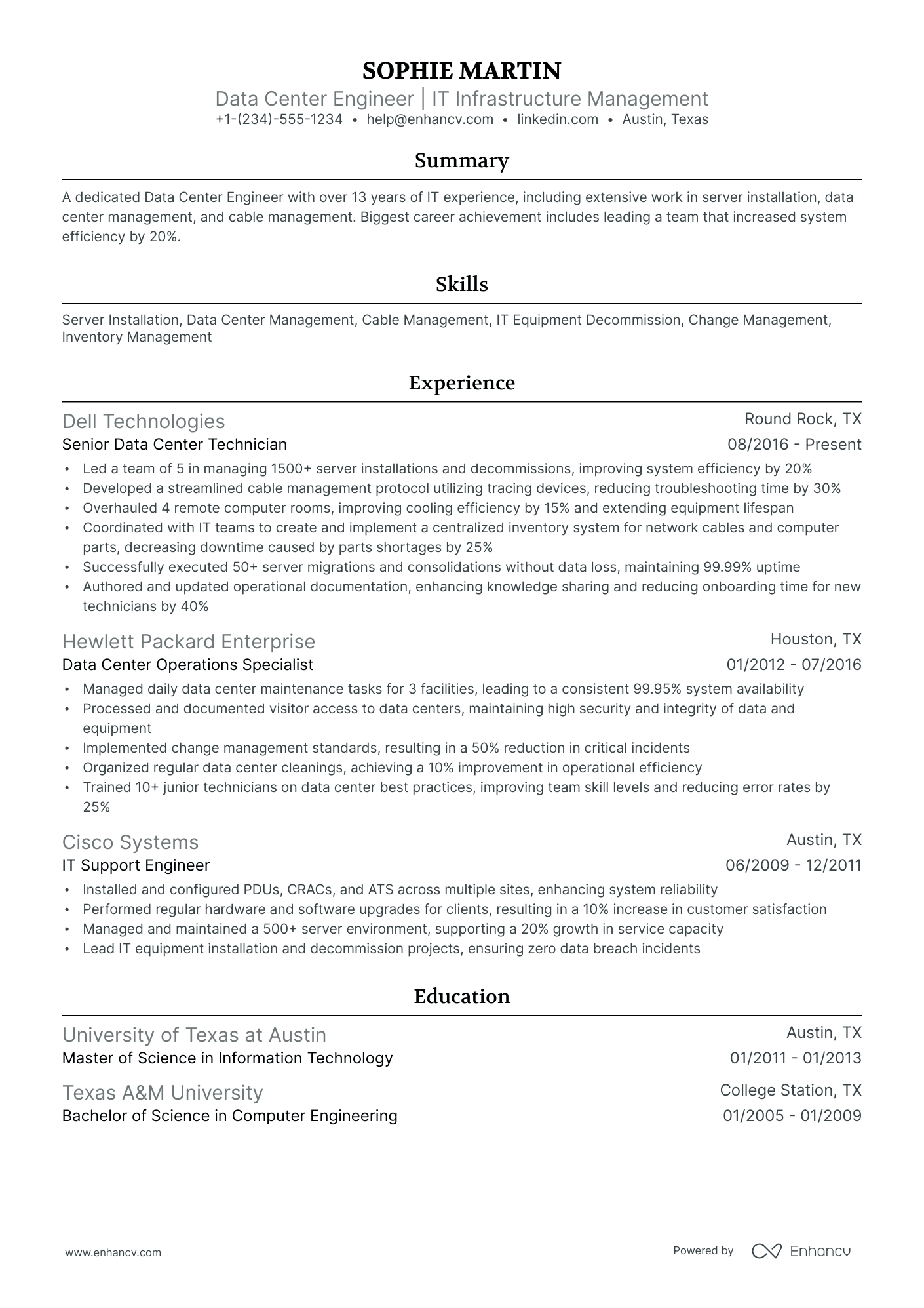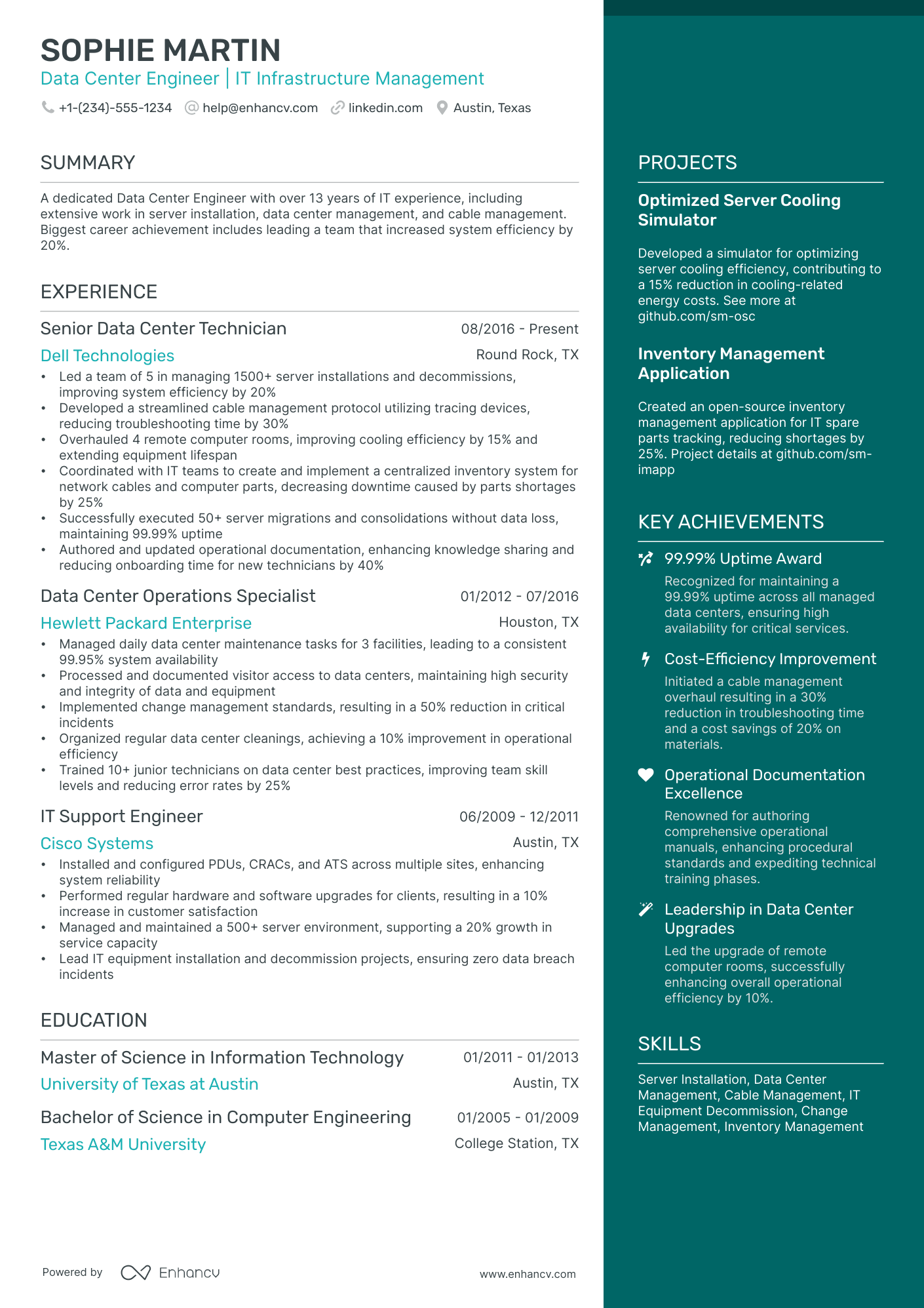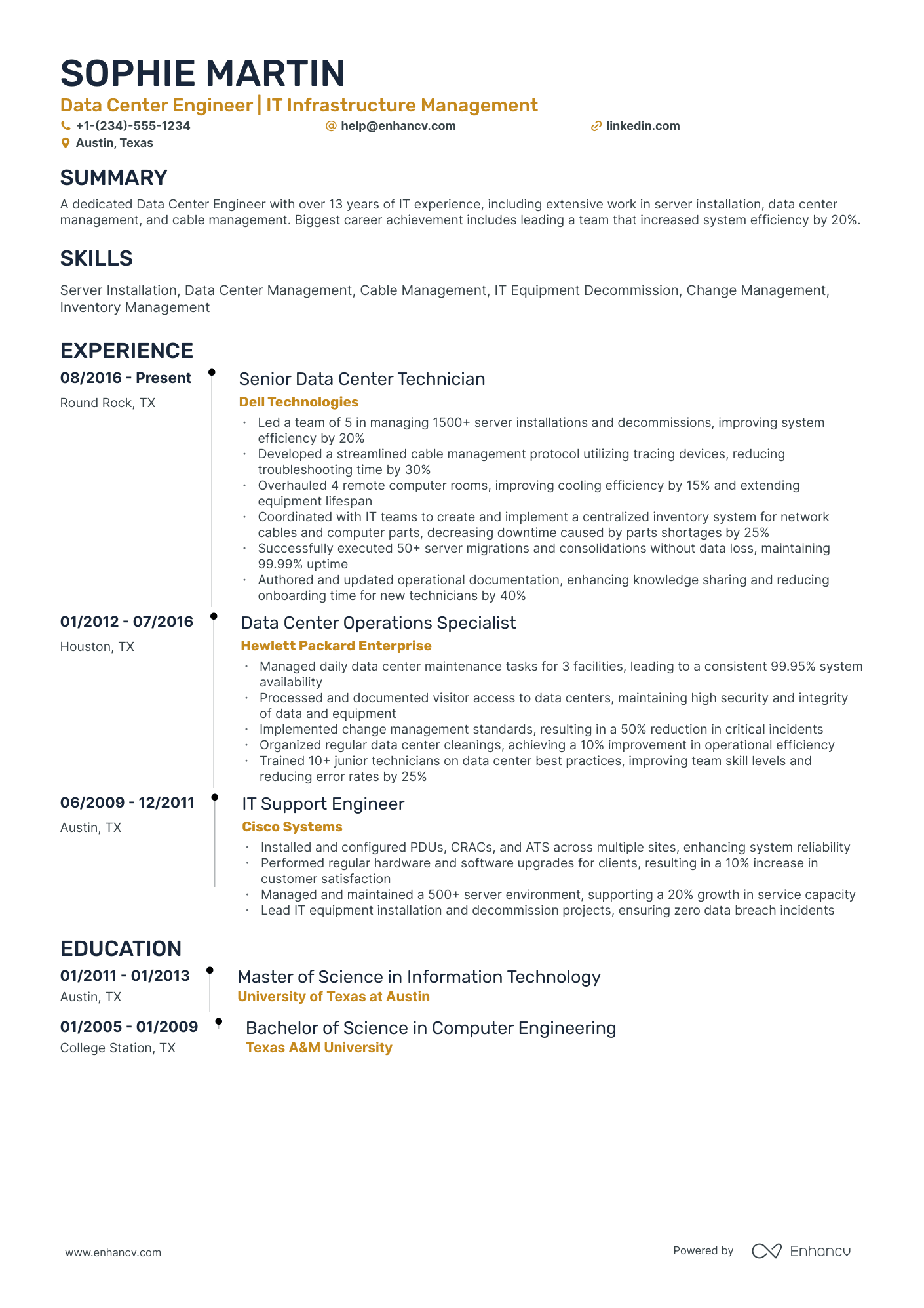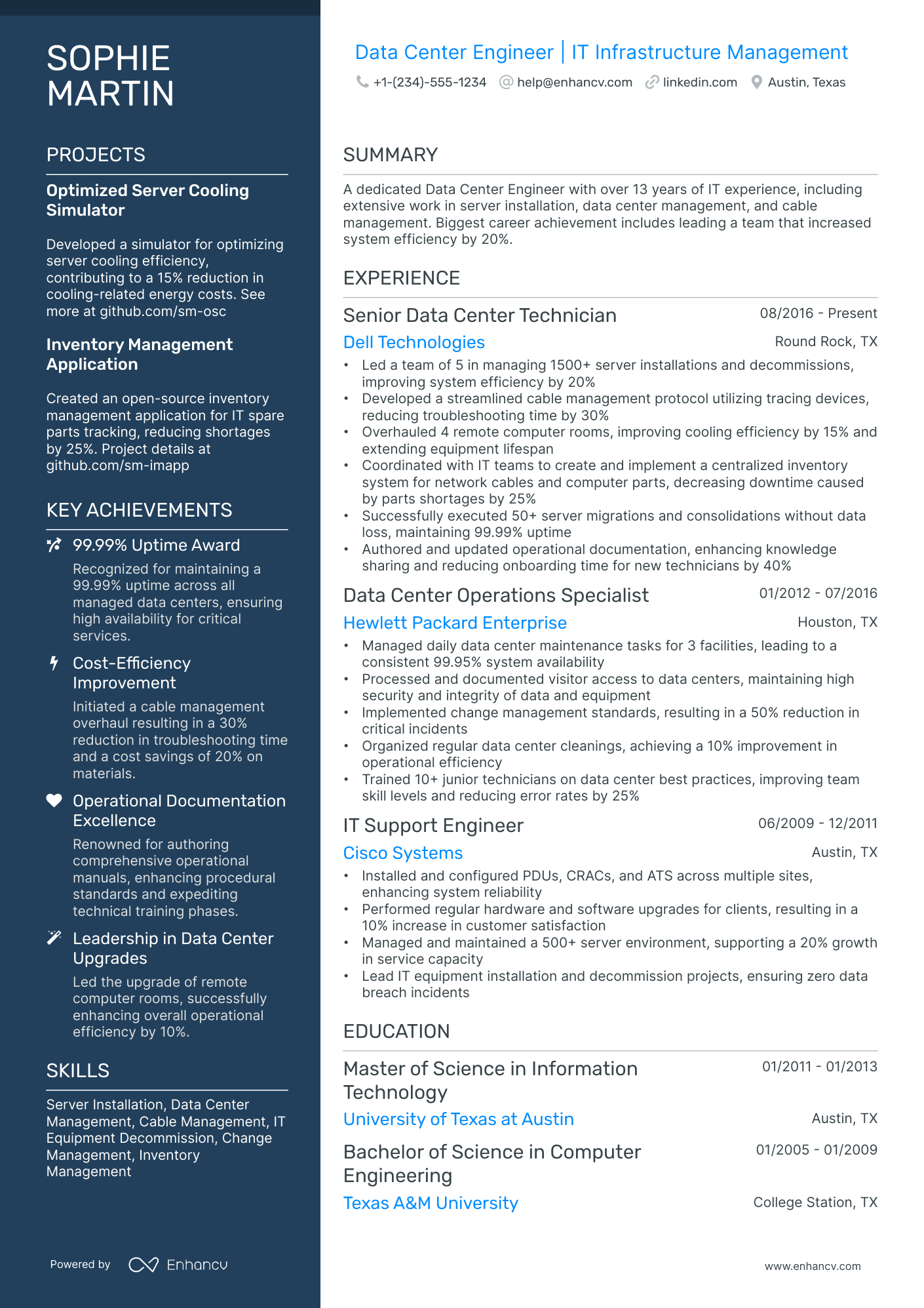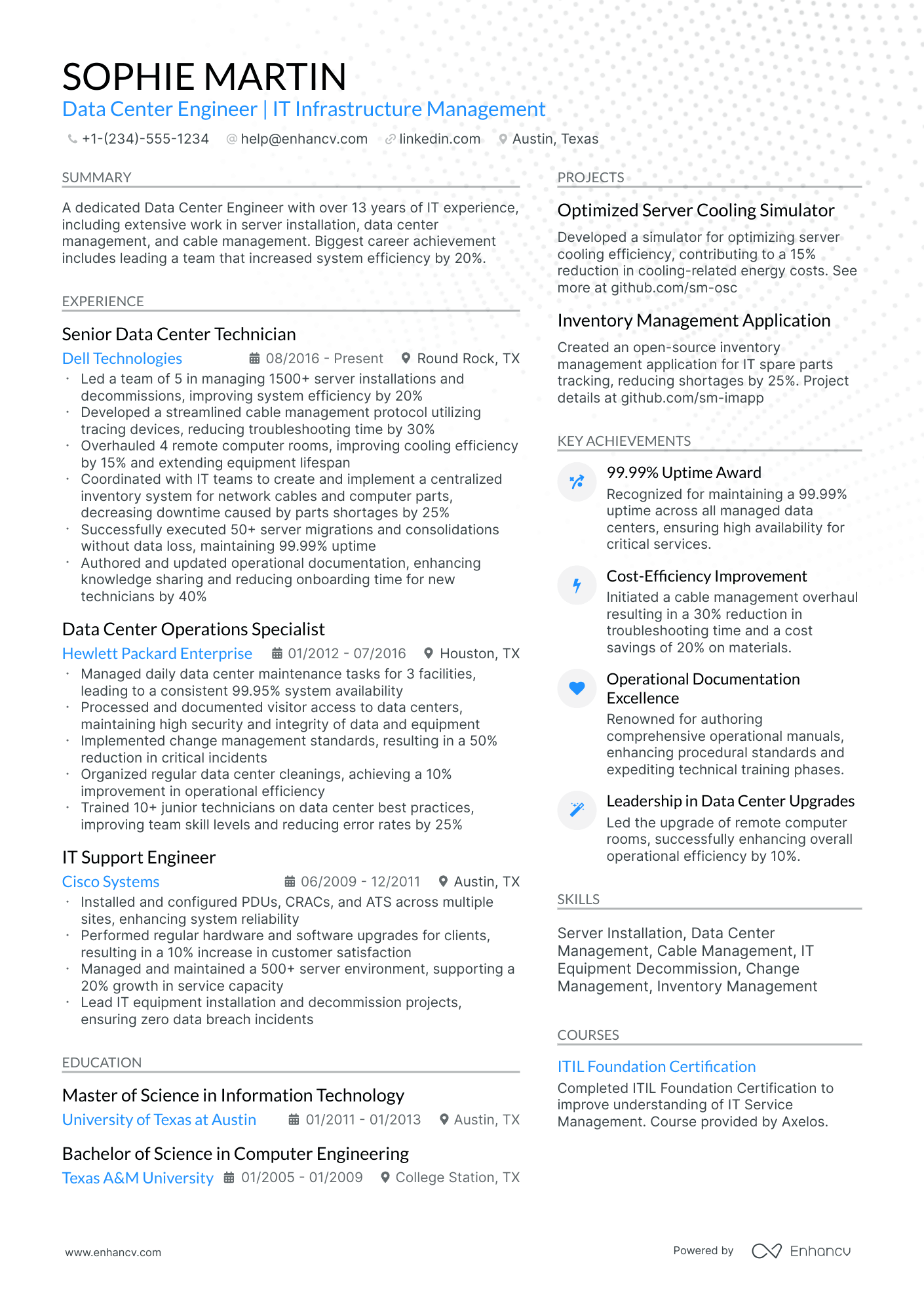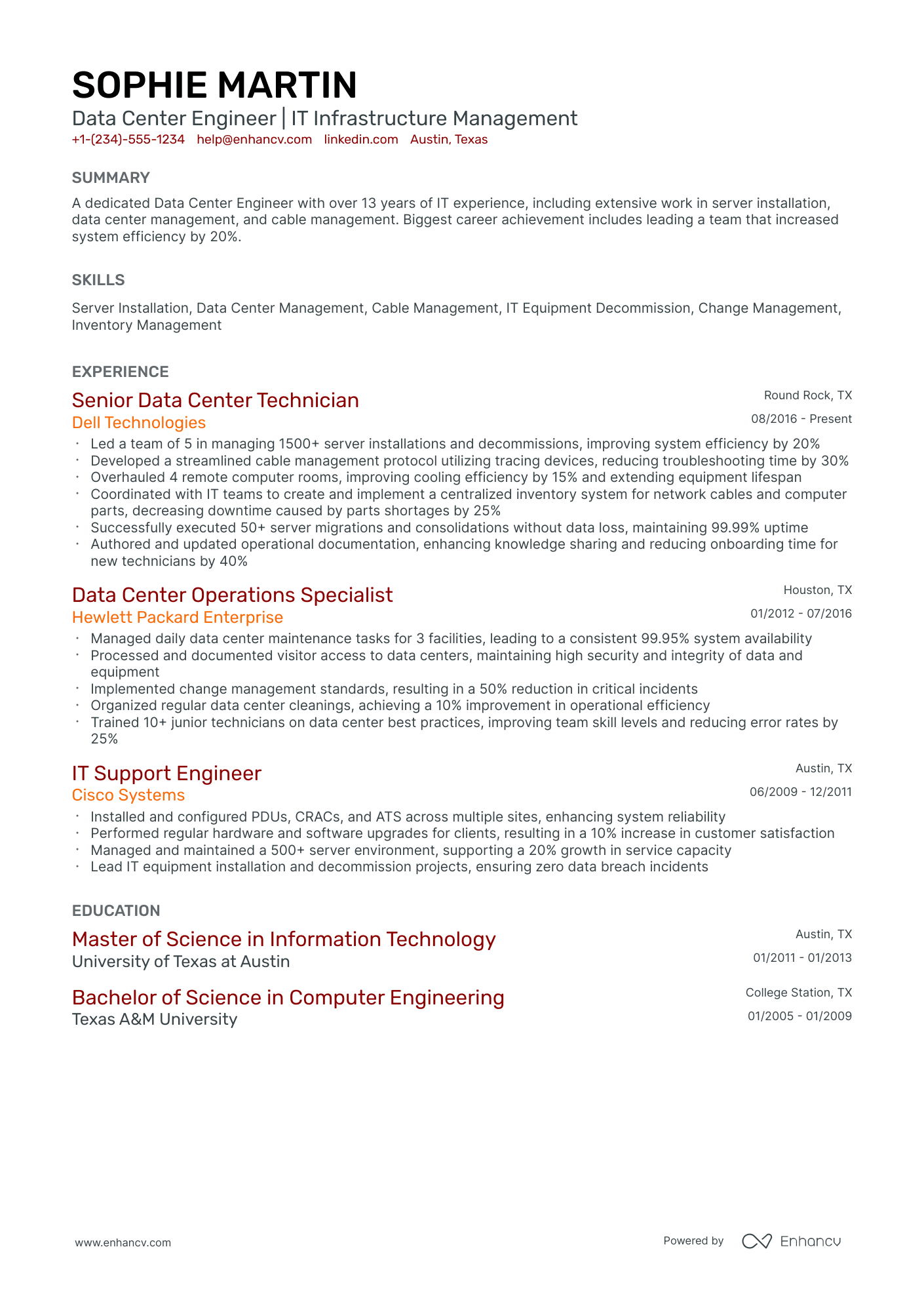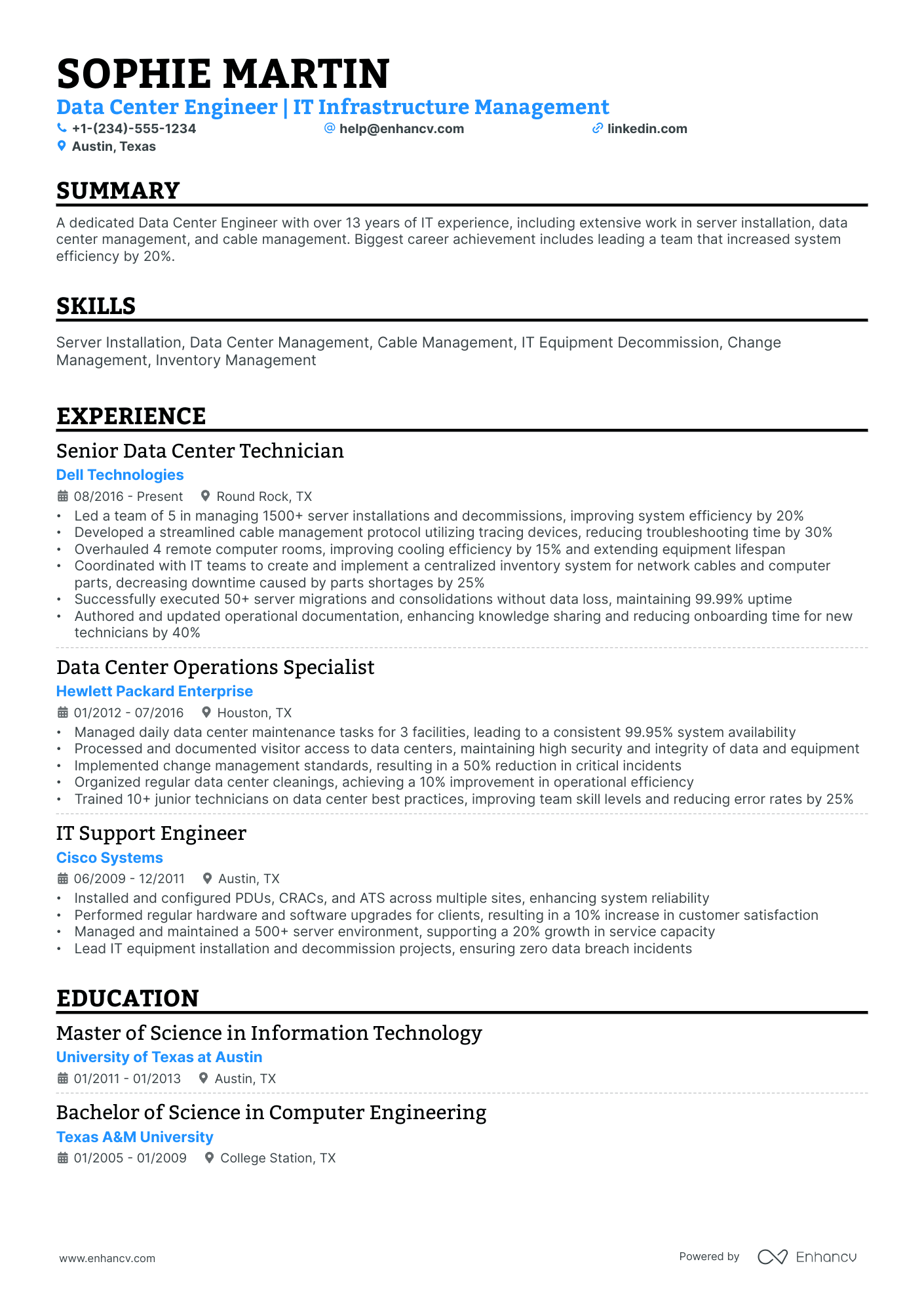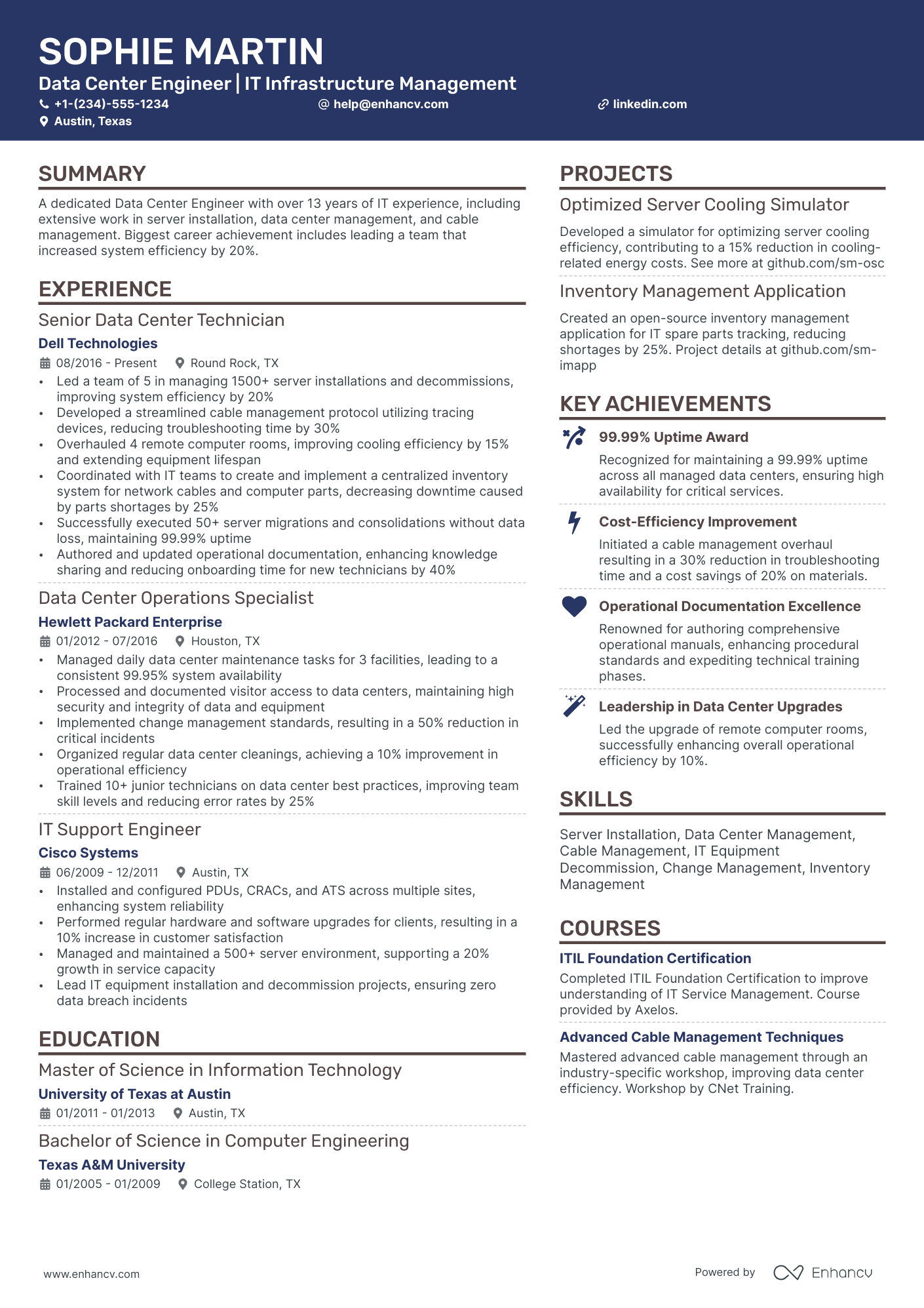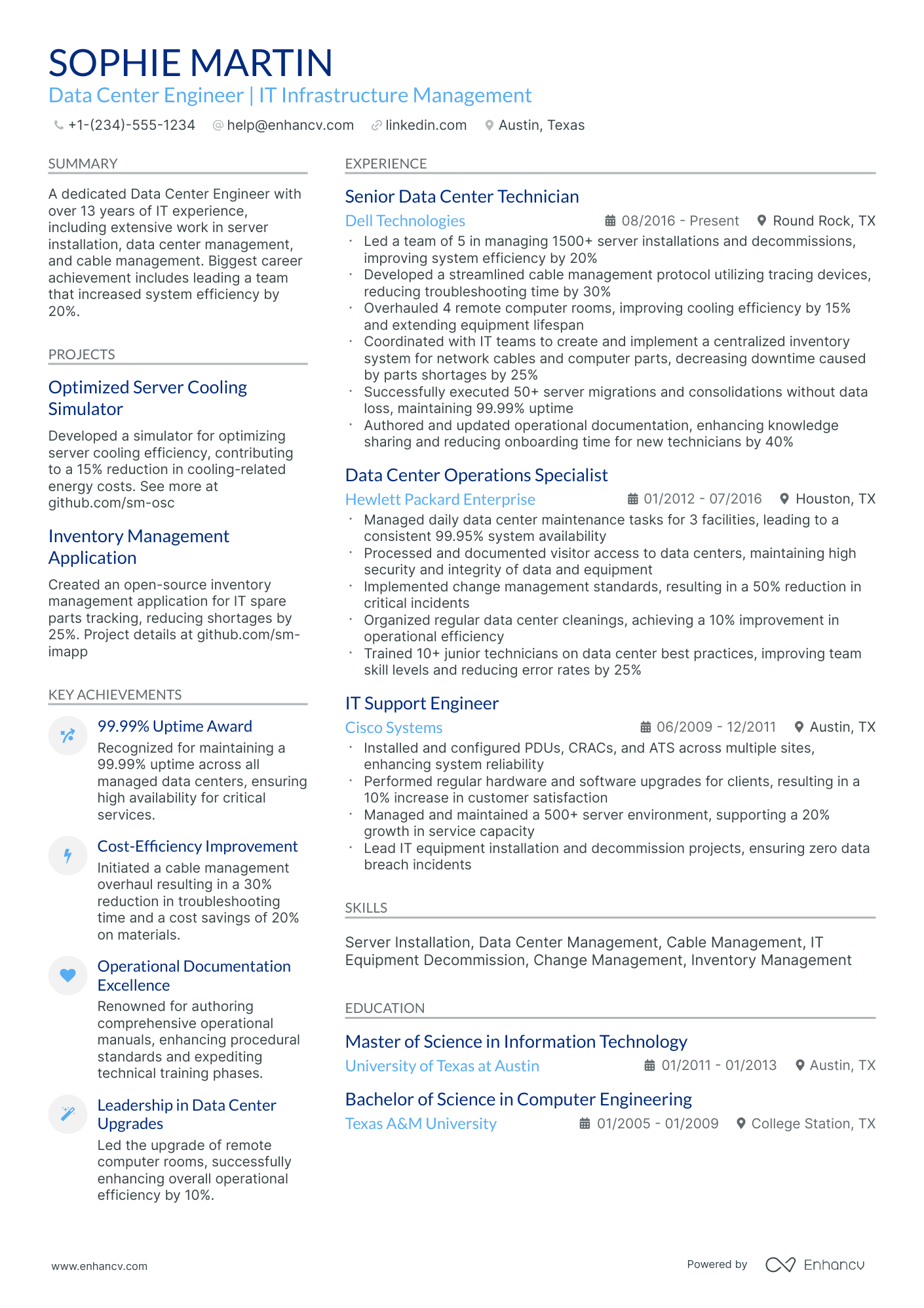As a data center engineer, one resume challenge you might face is effectively showcasing the breadth of your technical expertise and the impact of your work on system reliability and efficiency. Our guide can help you navigate this challenge by providing targeted advice on how to articulate your skills and achievements in a way that resonates with hiring managers in your industry.
- The most straightforward and effective resume format, ensuring your data center engineer resume stands out among numerous candidate profiles;
- The significance of the top one-third of your resume, including the header, summary or objective, and skills section, and its impact on recruiters;
- Frameworks and structures used by real data center engineer professionals, offering insights on how to enhance your resume with industry-specific expertise;
- A variety of data center engineer resume sections that bolster your profile, showcasing your comprehensive capabilities and distinctiveness.
Gaining insights from the best has never been easier. Explore more data center engineer resume examples below:
- Data Center Technician Resume Example
- GCP Data Engineer Resume Example
- Statistical Data Analyst Resume Example
- Database Assistant Resume Example
- Marketing Data Analyst Resume Example
- Database Manager Resume Example
- Excel Data Analyst Resume Example
- Data Management Analyst Resume Example
- Azure Data Engineer Resume Example
- Data Warehouse Consultant Resume Example
The ultimate formula for your data center engineer resume format
Our best advice on how to style your data center engineer resume is this - first, take the time to study the job advert requirements.
The resume format you select should ultimately help you better align how your experience matches the specific role.
There are four crucial elements you need to thus take into consideration:
- How you present your experience. If you happen to have plenty of relevant expertise, select the reverse-chronological resume format to organize your experience by dates, starting with the latest.
- Don't go over the top with writing your resume. Instead, stick with a maximum of two-page format to feature what matters most about your profile.
- Headers aren't just for "decoration". The header of your resume helps recruiters allocate your contact details, portfolio, and so much more.
- The PDF format rules. It's the most common practice to submit your data center engineer resume as a PDF so that your resume doesn't lose its layout. However, make sure the read the job well - in some instances, they might require a doc file.
Think about the location of your application – Canadian resumes, for instance, might follow a different structure.
Upload & Check Your Resume
Drop your resume here or choose a file. PDF & DOCX only. Max 2MB file size.
PRO TIP
Showcase any ongoing or recent educational efforts to stay updated in your field.
The six in-demand sections for your data center engineer resume:
- Top one-third should be filled with a header, listing your contact details, and with a summary or objective, briefly highlighting your professional accolades
- Experience section, detailing how particular jobs have helped your professional growth
- Notable achievements that tie in your hard or soft skills with tangible outcomes
- Popular industry certificates to further highlight your technical knowledge or people capabilities
- Education to showcase your academic background in the field
What recruiters want to see on your resume:
- Experience with managing and maintaining data center infrastructure, including servers, storage systems, and network equipment.
- Knowledge of data center best practices, such as ITIL or Uptime Institute standards, and compliance requirements like ISO 27001 and SOC 2.
- Familiarity with virtualization technologies and cloud services, such as VMware, Hyper-V, AWS, Azure, or Google Cloud Platform.
- Proficiency in automation and orchestration tools, such as Ansible, Puppet, or Terraform, for efficient infrastructure management.
- Demonstrable skills in monitoring, troubleshooting, and resolving hardware and software issues in a data center environment.
The experience section or the essence of your professional data center engineer resume
Recruiters always have and always will appreciate well-written data center engineer resume experience sections.
The experience section is perhaps the most crucial element of your professional presentation, as it needs to answer job requirements while showcasing your technical expertise and personality.
Create your best resume experience section yet by:
- Selecting only relevant experience items to the role you're applying for;
- Always ensure you've listed a metric to quantify your success alongside each experience item;
- Create a narrative that showcases your data center engineer career succession: this goes to show the time and effort you've invested in the field to build your experience from the ground up;
- Within each experience bullet, consider a problem you've solved, the skills you've used, and the bigger impact this has made in the organization.
Take a look at how other real-life professionals have curated their experience with the data center engineer samples below:
- Implemented and maintained a virtualized environment using VMware for over 50 servers, increasing server efficiency and resource utilization by 40%.
- Led the transition to a cloud-based disaster recovery solution and successfully conducted biannual drills to ensure a rapid response to potential data loss scenarios.
- Collaborated with cross-functional teams on the deployment of a centralized monitoring system that decreased incident response time by 25%.
- Designed and executed a data center consolidation project that reduced physical footprint by 30% without impacting system performance or availability.
- Supervised the installation of state-of-the-art cooling systems that led to a 20% reduction in cooling costs and significantly lowered the data center's carbon footprint.
- Provided technical leadership for a team of 10, mentoring junior engineers and fostering a culture of continuous improvement and innovation.
- Enhanced network security measures, which reduced the risk of data breaches by effectively implementing next-generation firewalls and intrusion detection systems.
- Optimized data storage solutions, achieving a 35% improvement in data retrieval times through the integration of SSD technology.
- Directed a critical data center migration project, ensuring a seamless transition with zero downtime for customer-facing services.
- Established a robust data backup and recovery strategy that ensured business continuity during several unexpected outages, resulting in negligible data loss.
- Led the development of automated deployment scripts, reducing manual configuration time by 50% and significantly streamlining the server provisioning process.
- Conducted regular audits of data center infrastructure, identifying and rectifying issues before they could impact system stability or performance.
- Played a pivotal role in the design and implementation of a scalable network architecture, accommodating a 100% increase in traffic without degradation in performance.
- Pioneered the adoption of energy-efficient power distribution units (PDUs) within the data center, ultimately saving the company 10% annually on energy costs.
- Managed vendor relationships to ensure the timely delivery of critical hardware components, avoiding potential delays in project timelines.
- Closely monitored data center environmental conditions and made adjustments to HVAC settings that maintained optimal operating temperatures and humidity levels.
- Conducted comprehensive analysis on power usage effectiveness (PUE), which informed the decision to upgrade to more energy-efficient servers reducing power draw by 15%.
- Championed the integration of automated alerting systems, markedly reducing the rate of unplanned downtime by quickly addressing issues before they escalated.
- Formulated and executed data center asset management policies leading to a 20% improvement in asset utilization and reduced excess inventory.
- Innovated a custom solution for real-time power load monitoring, equipping the team with precise data to make informed decisions regarding infrastructure scaling.
- Spearheaded the implementation of an advanced fiber optic network within the data center, significantly boosting data transmission rates and reliability.
- Orchestrated regular system firmware and software updates, ensuring that the data center's mission-critical systems ran on the most secure and efficient versions.
- Collaborated with a global team to establish unified data center standards, resulting in improved operational efficiency and reduced troubleshooting times.
- Managed the commissioning of new server hardware, working diligently to meet tight deadlines while adhering to stringent quality standards.
- Instrumental in developing a comprehensive disaster recovery plan that was actioned during a critical power outage, effectively mitigating potential data losses.
- Implemented an innovative server virtualization initiative that downsized the physical server count by 25%, leading to cost savings and enhanced manageability.
- Developed Python scripts to automate routine data center maintenance tasks, freeing up valuable time for engineers to focus on more complex issues.
- Managed the deployment of a multi-tiered storage solution that adapted dynamically to changing data demands, optimizing for performance and cost efficiency.
- Performed rigorous load testing on data center systems to validate architecture resiliency under extreme conditions, providing assurance of system robustness.
- Engaged in cross-departmental collaboration to align data center operations with the organization's broader technology strategy and business goals.
Quantifying impact on your resume
- Highlight the scale of the data center operations you have managed or contributed to, including the number of servers, volume of data storage, and network capacity.
- Specify the amount of downtime reductions achieved through proactive maintenance or prompt troubleshooting.
- Mention the energy efficiency improvements made in power usage effectiveness (PUE) with quantitative results.
- Detail the cost savings accomplished by optimizing resources or implementing new technologies.
- Quantify the number of hardware and software upgrades completed and their impact on performance improvement.
- Showcase the increase in data center capacity or performance you have been involved with.
- Present the percentage of incident resolutions met within the set service level agreements (SLAs).
- Include the number of projects managed or co-managed and their outcomes in improving data center operations.
Action verbs for your data center engineer resume
What if my data center engineer experience doesn't match the requirements?
You've just graduated from college and may have no real world job experience . What should you include within your resume then?
Instead of making up information or adding irrelevant past jobs (e.g. your on-campus work during freshman year), you can:
- Shift the focus from your professional experience to your community impact with your volunteer work. This would showcase numerous soft skills you've built over time (e.g. interpersonal communication);
- Highlight the projects you've completed, as part of your coursework, or, on your own. Thus, you will align your technical background with recruiters' requirements;
- Consider spotlighting your transferrable skills. Or, what lessons and talents your current professional and personal experience has taught you and how they could benefit your potential employers;
- Even if you've had a few months of internship experience, that is relevant for the role, make sure to include this. Recruiters do care about the years of experience you happen to have, but, at the end of the day, your profile would also be assessed based on role alignment.
Recommended reads:
PRO TIP
Listing your relevant degrees or certificates on your data center engineer resume is a win-win situation. Not only does it hint at your technical capabilities in the industry, but an array of soft skills, like perseverance, adaptability, and motivation.
Popular data center engineer hard skills and soft skills for your resume
Apart from assessing your professional expertise, recruiters are on the lookout for whether your skills align with the job.
Your profile would thus be assessed in regard to your:
- Hard or technical skills - your ability to perform on the job using particular technologies or software
- Soft skills - how you adapt, communicate, and thrive in different environments.
Both types of skills - hard and soft skills - are important for your resume, so make sure to create a dedicated skills section that:
- Lists up to five or six skills that align with the job advert.
- Integrates vital keywords for the industry, but also reflects on your personal strengths.
- Builds up further your skills with an achievements section within which you explain what you've achieved thanks to using the particular skill.
- Aims to always quantify in some way how you've used the skill, as it's not enough to just list it.
What are the most sought out hard and soft skills for data center engineer roles?
Check out the industry's top choices with our two dedicated lists below:
Top skills for your data center engineer resume:
Cisco Networking
VMware
Microsoft Azure
Linux Administration
Storage Area Networks (SAN)
Data Center Infrastructure Management (DCIM)
Network Security
Virtualization Technologies
Power Distribution Units (PDU)
Fire Suppression Systems
Problem-Solving
Communication
Team Collaboration
Time Management
Attention to Detail
Adaptability
Analytical Thinking
Project Management
Customer Service Orientation
Critical Thinking
PRO TIP
If you're in the process of obtaining your certificate or degree, list the expected date you're supposed to graduate or be certified.
Showcase academic background with education and certifications' sections
Listing your education and certifications should be a rudimentary part of your resume writing.
Including your relevant academic background - in the form of your higher education degree and niche-specific certificates - will prove knowledge of the industry.
For your education section:
- Start by including your degree, followed by start and graduation dates, as well as the institution;
- You could include relevant coursework, major/minor , or GPA, only if your've just graduated from college or if this information would further support your application;
- If you have an "ongoing" degree, you can still list it in case you think your diploma can impress recruiters or it's required;
Follow a similar logic for your certifications section by listing the institution, alongside dates you've obtained the certificate. For some of the most recent and relevant industry certificates , check out the next part of our guide:
The top 5 certifications for your data center engineer resume:
- Certified Data Centre Professional (CDCP) - EXIN
- Certified Information Systems Security Professional (CISSP) - (ISC)²
- Cisco Certified Network Professional Data Center (CCNP Data Center) - Cisco
- Data Center Certified Associate (DCCA) - Schneider Electric
- VMware Certified Professional – Data Center Virtualization (VCP-DCV) - VMware
PRO TIP
Listing your relevant degrees or certificates on your data center engineer resume is a win-win situation. Not only does it hint at your technical capabilities in the industry, but an array of soft skills, like perseverance, adaptability, and motivation.
Recommended reads:
Which one to use: a resume summary or a resume objective?
The data center engineer resume summary or objective serves as a good introduction to your experience for recruiters.
Have you ever wondered which one (the summary or objective) will be more appropriate for your data center engineer resume?
- If you are a less experienced professional, write a resume objective statement. The objective is about three sentences long and provides recruiters with information about your career goals, strengths, and achievements . It should basically denote how you see yourself in this particular role, and what is your relevant experience and/or know-how;
- If you happen to have plenty of relevant experience, select your most impressive achievements for your resume summary. The summary is no longer than five sentences and serves as a storytelling instrument - highlighting your greatest career wins . Don't forget to align your summary with the job requirements to ensure your resume stays relevant to the role.
Read on for more information and examples of resume summaries and objectives from real world professionals.
Resume summaries for a data center engineer job
- Dedicated data center engineer with 7+ years of experience specializing in managing server infrastructure, data integrity, and disaster recovery planning. Proven track record in reducing system downtime by 30% at TechSolutions Inc. Expert in VMware, SAN management, and automation scripting seeking to leverage in-depth knowledge to optimize data center operations.
- Results-driven IT professional pivoting into the data center engineering field, bringing 10 years of extensive experience in network administration and complex system integrations. Eager to apply a strong background in cloud computing, Cisco hardware, and security protocols to ensure uninterrupted service and scalable data center solutions.
- With a decade of experience in mechanical engineering and facility management, I am transitioning to data center engineering to apply my skills in HVAC systems and electrical distribution. Keen to utilize hands-on expertise in physical infrastructure to maximize data center efficiency and reliability.
- Accomplished data center engineer boasting 15 years in the industry, with an emphasis on large-scale data center management, spearheading a seamless migration of 10,000+ servers for GlobalNet Corp. In-depth knowledge of data replication, load balancing, and multi-site architecture, seek to deploy cutting-edge solutions for complex data center challenges.
- Seeking to begin a challenging journey in data center engineering, my objective is to grow from a foundational understanding of server hardware and network configurations. Motivated to develop a deep expertise in scalable system design and operational best practices within a dynamic, growth-focused data environment.
- As an enthusiast of technology and systems engineering with a fresh degree in computer science, my goal is to immerse myself in data center operations. Optimistic about the potential to harness analytical skills and a solid understanding of database principles to deliver high-performance data services.
Optimize your resume summary and objective for ATS
Drop your resume here or choose a file.
PDF & DOCX only. Max 2MB file size.
Taking your data center engineer resume to the next level with these four additional resume sections
Your data center engineer resume can feature a variety of skills (both hard and soft) in diverse sections. Choose those that align best with the job requirements and reflect your suitability for the company culture.
Consider these four additional resume sections recommended by our experts:
- Languages - State any languages you are proficient in and your level of proficiency. This demonstrates your commitment to communication and potential for international growth.
- Projects - Highlight up to three significant projects you've completed outside of work, showcasing skill development. Include a link to your project portfolio in the data center engineer resume header, if applicable.
- My Time - How you allocate your time outside work can indicate your organizational skills and cultural fit within the company.
- Volunteering - Detail causes you're passionate about, roles you've held, and achievements in volunteering. Such experiences likely have honed a range of soft skills crucial for your dream job.
Key takeaways
We've reached the end of our data center engineer resume guide and hope this information has been useful. As a summary of our key points:
- Always assess the job advert for relevant requirements and integrate those buzzwords across various sections of your data center engineer resume by presenting tangible metrics of success;
- Quantify your hard skills in your certificates and skills section, while your soft skills in your resume achievements section;
- Ensure you've added additional relevant experience items, such as extracurricular activities and projects you've participated in or led;
- Use both your resume experience and summary to focus on what matters the most to the role: including your technical, character, and cultural fit for the company.
